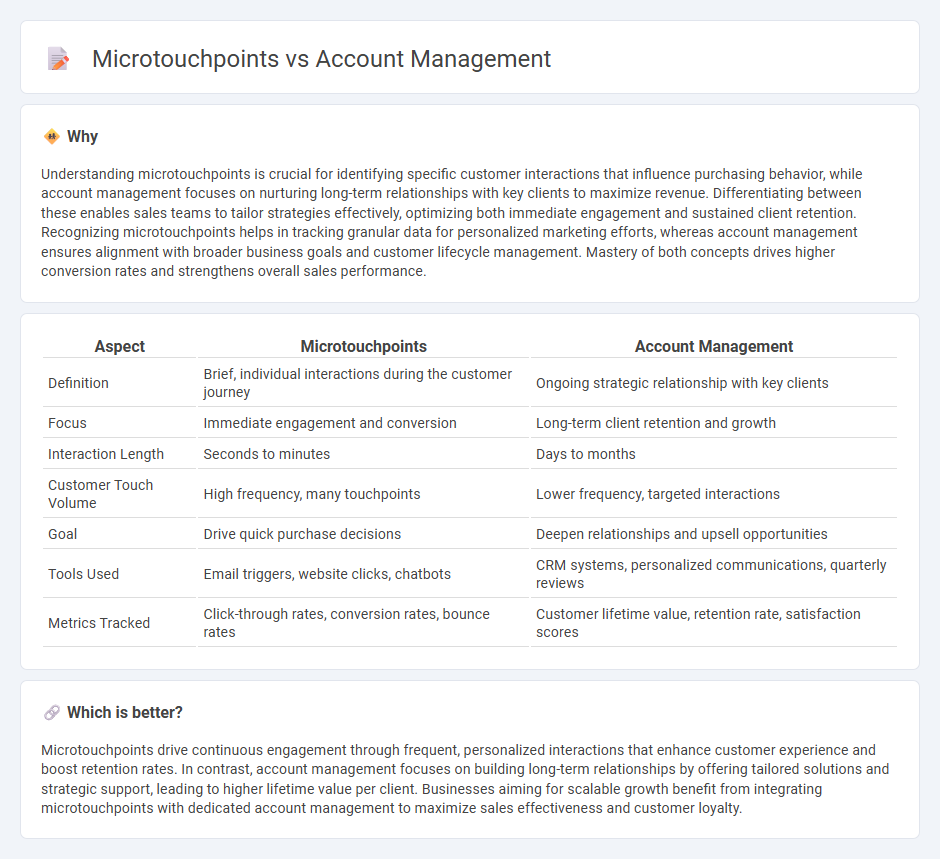
Microtouchpoints in sales consist of brief, targeted interactions that engage prospects throughout the buyer's journey, enhancing customer experience and fostering timely responses. Account management focuses on building long-term relationships, ensuring client satisfaction, and driving continuous growth through personalized service and strategic support. Explore how integrating microtouchpoints with account management can optimize your sales performance.
Why it is important
Understanding microtouchpoints is crucial for identifying specific customer interactions that influence purchasing behavior, while account management focuses on nurturing long-term relationships with key clients to maximize revenue. Differentiating between these enables sales teams to tailor strategies effectively, optimizing both immediate engagement and sustained client retention. Recognizing microtouchpoints helps in tracking granular data for personalized marketing efforts, whereas account management ensures alignment with broader business goals and customer lifecycle management. Mastery of both concepts drives higher conversion rates and strengthens overall sales performance.
Comparison Table
| Aspect | Microtouchpoints | Account Management |
|---|---|---|
| Definition | Brief, individual interactions during the customer journey | Ongoing strategic relationship with key clients |
| Focus | Immediate engagement and conversion | Long-term client retention and growth |
| Interaction Length | Seconds to minutes | Days to months |
| Customer Touch Volume | High frequency, many touchpoints | Lower frequency, targeted interactions |
| Goal | Drive quick purchase decisions | Deepen relationships and upsell opportunities |
| Tools Used | Email triggers, website clicks, chatbots | CRM systems, personalized communications, quarterly reviews |
| Metrics Tracked | Click-through rates, conversion rates, bounce rates | Customer lifetime value, retention rate, satisfaction scores |
Which is better?
Microtouchpoints drive continuous engagement through frequent, personalized interactions that enhance customer experience and boost retention rates. In contrast, account management focuses on building long-term relationships by offering tailored solutions and strategic support, leading to higher lifetime value per client. Businesses aiming for scalable growth benefit from integrating microtouchpoints with dedicated account management to maximize sales effectiveness and customer loyalty.
Connection
Microtouchpoints play a crucial role in account management by enabling personalized interactions that enhance client relationships and drive sales growth. Effective account management leverages data from these small, frequent touchpoints to tailor strategies, identify upselling opportunities, and improve customer retention. This integration ensures a seamless customer experience, fostering loyalty and maximizing revenue across the sales cycle.
Key Terms
**Account management:**
Account management involves maintaining and nurturing long-term relationships with key clients, ensuring their needs are met through personalized service and strategic planning. Effective account management drives customer retention, increases lifetime value, and fosters trust by delivering consistent support and tailored solutions. Discover how mastering account management techniques can elevate client satisfaction and business growth.
Relationship Building
Account management centers on maintaining long-term client relationships through personalized service and strategic engagement. Microtouchpoints emphasize frequent, small interactions that nurture ongoing communication and reinforce trust at multiple customer journey stages. Explore how integrating these approaches enhances relationship-building effectiveness.
Strategic Planning
Strategic planning in account management emphasizes long-term client relationships, aligning business goals with tailored solutions to drive sustainable growth. Microtouchpoints involve brief, impactful interactions that reinforce client engagement and ensure continuous alignment with evolving needs. Explore how integrating strategic planning with microtouchpoints can optimize account performance and client satisfaction.
Source and External Links
What Is Account Management? (With Duties and Skills) - Account management involves daily oversight of client accounts to maintain business relationships, understand client needs, and collaborate with sales and marketing to maximize profits and customer satisfaction.
What is Account Management? - Account management is the strategic, post-sales process focused on nurturing long-term relationships with existing clients by understanding their needs, advocating for them within the company, and proactively offering solutions to drive retention and growth.
Account Management: Definition, Types and Best Practices - Account management is a strategic approach to building and maintaining key customer relationships through regular communication, customized solutions, and internal collaboration to enhance customer loyalty and revenue growth.
 dowidth.com
dowidth.com